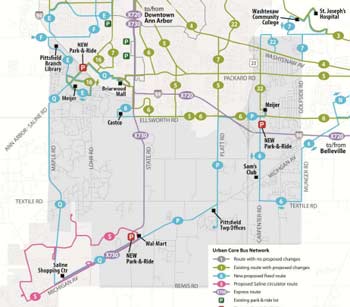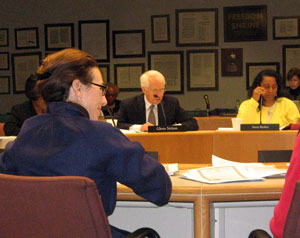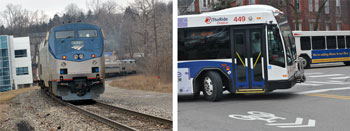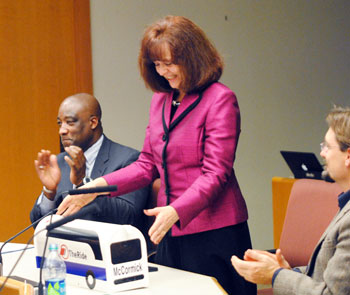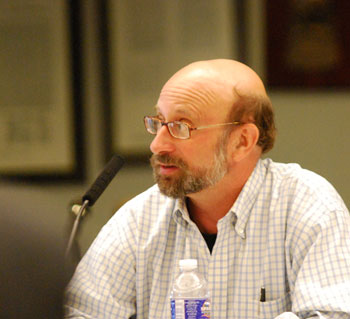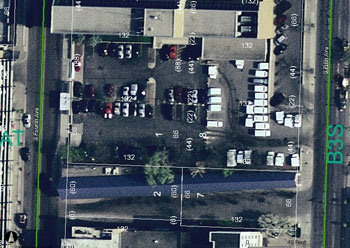Ann Arbor Transportation Authority board meeting (Sept. 15, 2011): With four of its seven members in attendance, the AATA board had just enough members present to transact two major pieces of business for the coming year. The board approved its 2012 fiscal year work plan and the budget that will support that plan.
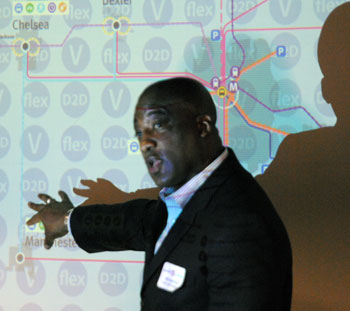
AATA's CEO Michael Ford presents an overview of the transit master plan to members of a financial group that will be making recommendations on funding options for countywide transportation. (Photos by the writer.)
The AATA fiscal year runs from Oct. 1 through Sept. 30. The budget approved by the board calls for expenses of $30,410,616 against only $29,418,995 in revenues, for a deficit in the coming year of $991,621. At the meeting, members stressed that the nearly $1 million deficit was due to one-time expenses associated with the planned transition to a countywide service. They also stressed that even by using unrestricted reserves over the next year to cover the planned deficit, the AATA would still be left with more than three months’ worth of operating expenses in its reserve.
Incurring a deficit this year was characterized as a way to “catapult” the organization forward, allowing it to pursue an aggressive work plan for the coming year, which was also approved at the meeting. Highlights of that work plan include reconstruction of the Blake Transit Center in downtown Ann Arbor. Design for the station is expected to be complete by the end of the year, with construction to start in spring 2012.
In terms of increased service, next year’s work plan includes a focus on: establishing the AATA as a vanpool service provider; establishing service to the Detroit Metro Airport; improving work-transportation connections between Ann Arbor and Ypsilanti; and continuing work on commuter rail. Also related to enhanced services, the AATA is also holding rider forums in October to get feedback on proposed increased service on Route #4, between Ann Arbor and Ypsilanti.
Related specifically to commuter rail, the board received an update at the meeting on the Washtenaw Livingston Line (WALLY) project, a proposed north-south commuter rail connection between Howell and Ann Arbor. The board expressed some caution about the project by passing a resolution that requires the board’s explicit approval for the expenditure of the $50,000 in next year’s budget allocated for station designs.
In other business, the board approved the selection of Plante & Moran as its new auditor. A new auditor rotation policy put in place by the board earlier this year made the previous auditor, Rehmann Robson, ineligible for the contract. The AATA board also approved a contract with an outside vendor to begin offering vanpool service.
In business that could be described as housekeeping, the board opted to keep its same slate of officers for the coming year and to keep the same meeting schedule – the third Thursday of the month. Jesse Bernstein was elected chair last year, and will continue in that role.
Also at the meeting, other members of the financial review group were announced. That group will be analyzing funding options for an expansion to countywide service. Previously, it had been announced that McKinley CEO Albert Berriz and former Washtenaw County administrator Bob Guenzel would co-chair the group. Their first meeting was Friday, Sept. 16, the day after the AATA board met. Berriz stated at that first meeting that the group will meet three more times, and will produce a white paper by the end of this year.
Related to that countywide effort, the initial board for an unincorporated transit authority – a precursor to an eventual formal authority – could be seated by Oct. 20, the date of the AATA board’s next meeting. It would include representatives from Ann Arbor, Ypsilanti, and other districts throughout the county. [Full Story]





